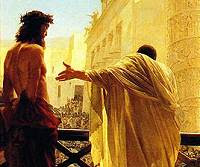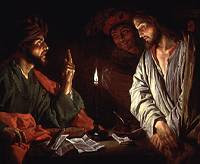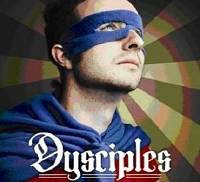Chapter 21 of John takes us right back to the beginning of Yahshua's ministry and also looks forward to the future of the church after he returns to the Father.
At the beginning of the chapter Yahshua appears to seven of the disciples, the third time that he has been with them since the resurrection.
 And does he find them busy with the work he left them to do? No! Instead of fishing for men, they have returned to fishing for fish (compare Luke 5:1-11). The problem is that they don't know what to do or how to do it. And the Holy Spirit, the Counsellor that was promised, is not yet with them to guide them and encourage them.
And does he find them busy with the work he left them to do? No! Instead of fishing for men, they have returned to fishing for fish (compare Luke 5:1-11). The problem is that they don't know what to do or how to do it. And the Holy Spirit, the Counsellor that was promised, is not yet with them to guide them and encourage them.At first they don't even recognise him, he's just a man on the beach. But then he does something that reminds them of an earlier occasion when he first called some of them to follow him, he repeats much the same process that's recorded in Luke. There are minor differences, this time he is not in the boat with them, and the net doesn't break. Do you notice how they're still not quite sure who he is? They want to ask him but don't dare. They know in their hearts but it just doesn't add up. They saw Lazarus come out of the grave but this is different, Yahshua rose without anyone to command him to come out. To perform a miracle is one thing, to be a miracle with nobody to command it was weird. They are still troubled and confused, emotions that are mixed with their earlier delight and rejoicing.
After sharing a meal with them Yahshua has a very interesting conversation with Peter. I can imagine him pointing to the pile of fish and saying, 'Do you love me more than these?'. And what does Peter say? 'Yes Lord, I like you - you know that.'
In English translations it looks as if Yahshua and Peter both use the same word - 'love'. But that's misleading. English doesn't have the same richness as the Koine Greek used here. Yahshua uses 'agape' which has shades of meaning around brotherly love, affection, good will, and benevolence. Peter uses 'phileo' which is less intense and means like, approve, welcome, or befriend. Agape is a deep love from the heart, phileo is lighter, more liking than loving.
To this response Yahshua says, 'Feed my little lambs'.
Then he asks Peter the same question, 'Do you love me?', Peter answers, 'You know I like you', and Yahshua says, 'Feed my sheep'.
But the third time Yahshua asks, 'Do you like me?' Peter is hurt because now he realises how half-hearted he has been. Ouch! Peter, headstrong Peter, needs to face reality. Perhaps he was ashamed to say a real, strong agape 'I love you' because denying the Lord is still so fresh in his mind. But the Messiah doesn't call us to be strong for him, he calls us to come to him in weakness so that he can be our strength.
And this is the part of the chapter that looks forward. Yahshua is looking forward to the long years, decades, and eventually centuries and millenia that lie ahead. Times when he will not be here walking and talking and cooking fish on the beach. Times when the church aided by the comfort and guidance of the Holy Spirit will need to learn and grow and thrive. He was looking forward even to today, and all through those centuries we have had the task of shepherding one another. When I am lost and struggling I may depend on you to lead me to good pasture. When you are lost and struggling I must do the same for you. This is the church, the living bride of the Lamb. How many times had he told them, 'Love one another as I have loved you'?
You and I were born for a time such as this. We're here to support and encourage one another, and we're to reflect Yahshua's love, treating the world the way he treated it. Reaching the poor and the hungry and the lost by showing them his living love working in us. Let's get to it!
< John 20 | Index | No more chapters >













